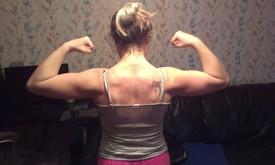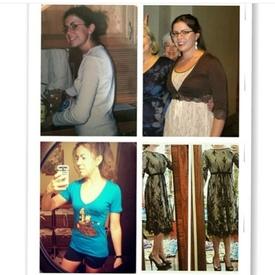Body Fat Percentage Weight Scales?

elephant2mouse
Posts: 906 Member
What are your recommendations regarding at home scales that also measure body fat %?
0
Replies
-
I'm interested in this answer to. I was considering getting some.
I realise they aren't entirely accurate, no at home method is. But seeing a estimate and seeing it going down week after week is probably enough.0 -
-
I just used the one at the gym. I am pleasantly surprised! I'm looking forward to weighing again in a month. I don't think I would spend the money on a scale for at home but it was £1 well spent.0
-
baconboobies wrote: »
I have callipers but I don't think I use them right and get really low or really high readings.
0 -
Karen_libert wrote: »I just used the one at the gym. I am pleasantly surprised! I'm looking forward to weighing again in a month. I don't think I would spend the money on a scale for at home but it was £1 well spent.
My gym uses calipers so I would have to get someone to do it for me.
0 -
The one I have at home is a waste. I can drink a 16 ounce glass of water and my weight goes up by a pound (which is correct) and my body fat percentage reading goes up by a couple tenths of a percent (which is not correct). I've stopped using it for anything but my weight.0
-
I really like my Taylor digital scale that I bought at target it uploads all my stats including body fat to MFP.
target.com/p/scale-taylor-digital-body-fat-smart/-/A-16334330#prodSlot=medium_1_17&term=scale0 -
I had a tanita scale. It says my body fat percentage is 42.8%

Question within a question- is that the same as bmi?0 -
NiqueKristan wrote: »I had a tanita scale. It says my body fat percentage is 42.8%

Question within a question- is that the same as bmi?
Nope, different measurements... BMI is kinda useless lol.0 -
No. Body fat percentage and BMI are not the same thing at all.
I have a Tanita scale that I like. It fluctuates daily, but only to the same degree that my weight fluctuates based on hydration and other factors. I weigh myself daily and just watch the trends. If it says my body fat drops, that often corresponds to being well hydrated or having pumped muscles and water retention. That's because the extra water is counted as lean body mass along with muscle and bone. If it goes up overnight, that often corresponds with being a little dehydrated. But I do know it tracks downward as I lose weight. Once I get closer to my goal, I might be more concerned with seeing how accurate it is, but for now the trend line is good enough. Oh, and I do it first thing in the morning after using the bathroom and before drinking anything.
Personally I don't think you can do the calipers yourself. If they can do it at the gym for you, great. Have them take each measurement three times and average them. That's what I used to do. I also think five sites is the most accurate. Sadly, many trainers these days at the big gyms don't know how to do it. They mostly use the handheld bio devices. 0
0 -
I don't think they are reliable.0
-
kikichewie wrote: »No. Body fat percentage and BMI are not the same thing at all.
I thought she meant BMI isnt a reliable factor either?? Not that they are the same thing.
0 -
The one I have at home is a waste. I can drink a 16 ounce glass of water and my weight goes up by a pound (which is correct) and my body fat percentage reading goes up by a couple tenths of a percent (which is not correct). I've stopped using it for anything but my weight.
A couple tenths of a percent seems accurate enough.
Different hydration levels are going to affect the reading. Just like normals scales it's best to weigh yourself consistently. Like in the morning, before breakfast but after the toilet.
If a glass of water changed your fat % by like 2-5 percent then sure it's sucks a bit. But getting a reading of 25.3 and then having a glass of water and getting 25.8 is good.
Do you need it more accurate the a whole number?
Can you notice the difference on two people where one is 20% and the other is 19%?
0 -
I don't think they are reliable.
0 -
I don't find them very accurate BUT in the absence of another readily accessible method, it 'sorta' gets you in the ballpark. IMO.0
-
I'm assuming my tanita scale is accurate +/- 3-5%. That still gets me in the ballpark since its not showing wild daily fluctuations. I'd be wary of it did, but the fluctuations are never more than a few tenths of a percent, and always in the right direction compared to the weight fluctuations.0
-
How precisely do they work? I noticed they all had "not for pregnant women or people with pacemakers" warnings on them which unsettled me enough not to buy one.0
-
justcat206 wrote: »How precisely do they work? I noticed they all had "not for pregnant women or people with pacemakers" warnings on them which unsettled me enough not to buy one.
I 'believe' it runs a small electrical current through your body via the soles of your feet and somehow measures the resistance (but I didn't google that so I'm SOOOOO guessing)!0 -
justcat206 wrote: »How precisely do they work? I noticed they all had "not for pregnant women or people with pacemakers" warnings on them which unsettled me enough not to buy one.
I 'believe' it runs a small electrical current through your body via the soles of your feet and somehow measures the resistance (but I didn't google that so I'm SOOOOO guessing)!
That's my understanding.
Muscle offers less resistance than fat. That's why being more or less hydrated affects the reading.
0 -
So the most accurate reading would be first thing in the morning, after the loo and before eating and drinking anything? ?0
-
I have the Omron one and find it somewhat reliable. It wasn't too far off of what I had measured at the gym.0
-
I have the Aria by Fitbit, and it seems consistent. I can't compare the accuracy, but I think it's better than measuring my waist and other parts with a tape measure and then doing a calculation. It's true that it works by running a small electrical current through your body, which is why it could interfere with a pacemaker (I don't know about pregnancy, but with a fetus it's always best to be careful). I think it estimates a percentage of fat and then everything else is "lean". That means if I'm dehydrated my lean mass seems smaller. My lean seems to fluctuate more than my fat, which I attribute to how well hydrated I am, but overall it's consistent.0
-
I have a WeighMax. I haven't had calipers done on me, but the Weighmax claims to be able to measure bone, water, fat and lean mass. I bought it on Groupon
 . I don't really pay attention, but maybe one day I'll get measured and compare. 0
. I don't really pay attention, but maybe one day I'll get measured and compare. 0 -
I find it strange that they're supposed to measure through electrical current, but if I input my age and gender different, I get a completely different result on fat, muscle, and water.0
-
Body fat scales are notoriously inaccurate and only useful in measuring trend in bf over time periods (not weeks but months)
Your body fat reading can be affected by how dehydrated you are, callouses, where you carry weight and they are even more inaccurate for women than men due to fat distribution
So if you can ignore the actual reading number ..which can easily be out 7 or 8% and focus on the average over say a few months then it's another number
Far better to just get naked and jump in front of a mirror0 -
I have an Ozeri Touch scale and been using it to track my progress. I started at 14.7% and it's been decreasing every week I use it, so it's at least accurate to itself.
Regarding precision, I had a hydrostatic body comp done and it said my BF% was 11.7%, compared to that same morning where my Ozeri said 12.3%. Not too far off!
That being said, I'll probably use it mostly for deltas in comparison to itself.0 -
I have a thinner scale...it is very consistent and is slowly moving down over time along with my weight. I never get bizarre readings from it, but I always use it first thing in the morning before I eat or drink anything to be consistent. Hydration levels influence the reading, so that's another reason to be consistent.
I have also used several of the body fat calculations that use body measurements...such as the navy formula, ymca, etc. I have a spreadsheet that calculates several of them and my scale tracks very closely with some of those, especially the Navy formula. The scale measurement also makes sense based on pictures of what different body fat levels supposedly look like. I think mine is pretty accurate...certainly within a couple of percent which is good enough for me. It's not like I would do anything differently if I found out the number was wrong anyway...at the end of the day the mirror and BMI tell me everything I need to know.
By the way, calipers are not any more accurate. They are highly dependent on the skill of the person using them, and at least the scale removes user error.0 -
You see I think the only point in knowing a BF number is so you can work out a protein macro ...which is why, based on notorious inaccuracy reports, I think the reading is fairly pointless over a visual check0
-
baconboobies wrote: »What are your recommendations regarding at home scales that also measure body fat %?
I have no experience or knowledge of this type of scale (though I would guess they are far from reliable).
I just wanted to say, BEST USERNAME EVER.
0 -
I have a tanita scale, and I only use it as a point of reference. They are not 100% accurate.
In fact I had my body fat done professionally with a DEXA scan and the difference between that and my scale was 12%! Yip it was 12% more than my scale advised!
Yeah sure, use them as a tool to check progress. I also use calipers alongside this too as that can also be a good point of reference but also not 100% accurate.0
This discussion has been closed.
Categories
- All Categories
- 1.4M Health, Wellness and Goals
- 398.5K Introduce Yourself
- 44.7K Getting Started
- 261K Health and Weight Loss
- 176.4K Food and Nutrition
- 47.7K Recipes
- 233K Fitness and Exercise
- 462 Sleep, Mindfulness and Overall Wellness
- 6.5K Goal: Maintaining Weight
- 8.7K Goal: Gaining Weight and Body Building
- 153.5K Motivation and Support
- 8.4K Challenges
- 1.4K Debate Club
- 96.5K Chit-Chat
- 2.6K Fun and Games
- 4.8K MyFitnessPal Information
- 18 News and Announcements
- 21 MyFitnessPal Academy
- 1.5K Feature Suggestions and Ideas
- 3.2K MyFitnessPal Tech Support Questions


















